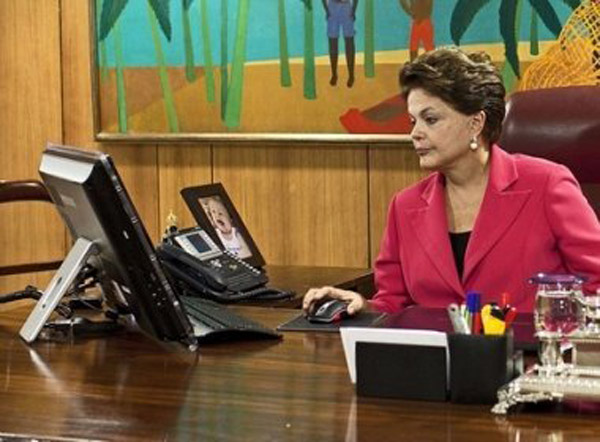Blog
Does Dilma really understand the Internet?

30/11/2013
Daniel Oppermann
The Brazilian government is developing an encrypted e-mail system for secure national communication. The system is developed by the federal postal service Correios in cooperation with the Federal Service of Data Processing (Serviço Federal de Processamento de Dados – Serpro). The original planing of this project happened in two steps. The first part was a paid system which enables users to send out encoded documents. This service is aiming especially at companies and government agencies. The second part is a free encrypted e-mail system for any user. While in the beginning these two parts were to be developed one after the other recent notifications about the NSA interceptions of Internet data in Brazil and other countries resulted in an acceleration of this process. The new plan is to launch both systems together in the mid of 2014. Besides that, President Dilma Rousseff is trying to force Internet service providers to store data of Brazilian users in Brazil instead of sending them to servers outside the country where foreign intelligence agencies could interfere and use these private data for their own interests.
The Brazilian government is developing an encrypted e-mail system for secure national communication. The system is developed by the federal postal service Correios in cooperation with the Federal Service of Data Processing (Serviço Federal de Processamento de Dados – Serpro). The original planning of this project happened in two steps. The first part was a paid system which enables users to send out encoded documents. This service is aiming especially at companies and government agencies. The second part is a free encrypted e-mail system for any user. While in the beginning these two parts were to be developed one after the other recent notifications about the NSA interceptions of Internet data in Brazil and other countries resulted in an acceleration of this process. The new plan is to launch both systems together in the mid of 2014. Besides that, President Dilma Rousseff is trying to force Internet service providers to store data of Brazilian users in Brazil instead of sending them to servers outside the country where foreign intelligence agencies could interfere and use these private data for their own interests.
It is in deed a very good move to finally start talking on a larger scale about privacy and about data protection in Brazil. So far, this topic seemed to be inexistent also for most Internet service providers in the country. Whoever already tried to cancel an account at any of the larger service providers in Brazil will have realized that these companies are just treating their clients’ data as if it was their own property. While at international providers anyone can cancel personal registrations with a simple click, most Brazilian service providers still urge their clients to call them on the phone where a friendly voice will then try to convince the client, that it is impossible to delete accounts or personal data. And to make things worse, there is no use to try to explain the friendly person on the line that (technically) it is of course possible to delete data, because this person really believes in what he is saying.
So once again: yes, it is important to talk about privacy and data protection. But it is also important to identify the agenda of the person who is talking about it. When President Dilma Rousseff is talking about the protection of personal data of Brazilian Internet users by trying to keep them inside the country she is following the same strategy as politicians do in countries all over the world: she is trying to gain votes by talking about the Internet, an issues she is not fully aware of. The closer we come to the presidential elections in October 2014 (coincidentally few weeks after the recently scheduled launching day of the new state-owned encrypted e-mail system) the more we will hear about the Internet and about the necessity to secure data of Brazilian users. What we see at the time is the attempt of the public sector in Brazil to gain popularity through a popular topic without having the necessary knowledge about the details. However, there are in deed people and organisations who could help out with their profound expertise. Unfortunately the Brazilian government is trying what many governments are trying to do: getting more control over the Internet without sufficiently consulting civil society and the private sector. In the early days of the web governments couldn’t care less about the www. In the past few years though, there has been a growing trend all over the world where governments realized the importance of the net as a means of communication and also regarding the content that is passed over it. Some started controlling web content, others opted for using the Internet to become more popular by enforcing regulations. None of these strategies really served the Internet users. When President Dilma Rousseff is now putting the Internet on the political agenda Internet users in Brazil need to use this opportunity to not blindly celebrate her but to remind her and the public sector in general to first check the facts before making too many promises. And then to let others participate in the decision-making process as well.